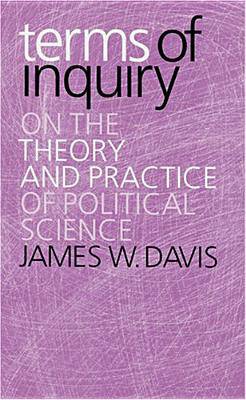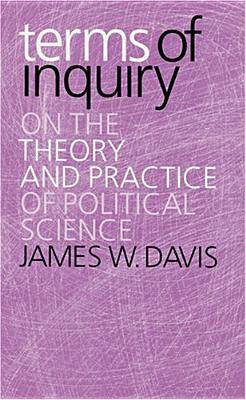
- Retrait gratuit dans votre magasin Club
- 7.000.000 titres dans notre catalogue
- Payer en toute sécurité
- Toujours un magasin près de chez vous
- Retrait gratuit dans votre magasin Club
- 7.000.0000 titres dans notre catalogue
- Payer en toute sécurité
- Toujours un magasin près de chez vous
Terms of Inquiry
On the Theory and Practice of Political Science
James W DavisDescription
Following World War II, American social science research became increasingly characterized by its adherence to the scientific method. The application of the scientific method and efforts to achieve precision in the social sciences opened the doors to large research programs, particularly in political science and international relations. However, as research became less accessible to the general public, policymakers began to ignore the findings and advice given to them by political scientists. The disconnect between policy and academic debates was exacerbated by the failure of empirical research to predict important developments, such as the fall of the Soviet Union and the peaceful resolution of the Cold War.
James W. Davis engages with the widespread dissatisfaction within the social sciences applying the scientific method to the study of social outcomes. Terms of Inquiry critically examines central claims and assumptions made by proponents of the scientific method in general, as well as the specific problems confronting the social sciences in particular. Davis seeks to develop a middle ground between the uncritical application of the scientific method in pursuit of empirical truths and the postmodernist assertion that there is no foundation upon which to build an edifice of social science.
Although interested in fundamental questions of scientific inquiry, Davis is nonetheless concerned by the increasing irrelevance of the field of political science to the actual practice of politics. In an effort to re-link empirical research to pressing questions of public policy, Terms of Inquiry provides a much needed discussion of practical research methods in a critically important discipline.
Spécifications
Parties prenantes
- Auteur(s) :
- Editeur:
Contenu
- Nombre de pages :
- 296
- Langue:
- Anglais
Caractéristiques
- EAN:
- 9780801880858
- Date de parution :
- 07-06-05
- Format:
- Livre broché
- Format numérique:
- Trade paperback (VS)
- Dimensions :
- 161 mm x 228 mm
- Poids :
- 394 g

Les avis
Nous publions uniquement les avis qui respectent les conditions requises. Consultez nos conditions pour les avis.






